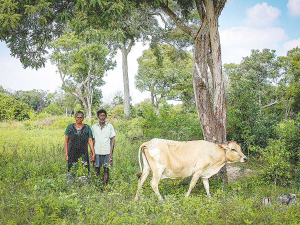EU processors eye more cheese, powder exports
European milk processors are eyeing more cheese and milk powder exports into South America following a landmark trade agreement signed last month.
 For the first time in their lives, Sri Lankans Nalayini and Chinniah were earning enough money to eat three meals a day and pay for their kids' education - thanks to one cow and a lot of hard work.
For the first time in their lives, Sri Lankans Nalayini and Chinniah were earning enough money to eat three meals a day and pay for their kids' education - thanks to one cow and a lot of hard work.
Nalayini and Chinniah, both in their 50s, have overcome more obstacles than most couples do in a lifetime.
They didn’t have an easy life before the civil war in Sri Lanka. They were living in poverty, raising their five children, and were only able to afford one meal a day instead of the usual three.
“My husband worked as a labourer in the paddy fields and cut firewood, while I was at home with the children,” says Nalayini.
“Life was very difficult…we didn’t have a traditional house with all the furnishings. We lived in a small place made from coconut leaves and slept on a mat on the ground. We would always get wet when it rained. We lived like that for a long time,” she says.
When the civil war started in Sri Lanka, Nalayini and Chinniah with their children fled for their lives. “We moved from place to place because the bombs were falling everywhere. We hid in bunkers to protect ourselves. We were convinced we would die.”
The couple managed to make it to one of the camps for displaced people where they stayed for a year.
“We were given food and water and other basics, but we couldn’t go anywhere. All we wanted was to go home.”
When the war was over, the family returned to their home village, but they were traumatised.
“We were scared all the time. We feared the bombing would start up again—that the whole war would start all over.”
Not only that, when the family returned there was nothing left – home was destroyed and goats and cows were gone.
Nalayini and Chinniah rebuilt their lives step-by-step with determination. They didn’t have any other choice.
“At first, we built a kind of makeshift house. After a couple of months, we were able to get some supplies to make our house a little stronger. After three years, we managed to build a sturdy, brick home for our family.”
At the same time, the couple joined Tearfund’s dairy farming programme. They had owned cows before the war and knew the basics of how to care for livestock.
“We received a pregnant cow, attended various training sessions on how to care for and raise the cows well so we could increase their milk supply.”
Global trade has been thrown into another bout of uncertainty following the overnight ruling by US Supreme Court, striking down President Donald Trump's decision to impose additional tariffs on trading partners.
Controls on the movement of fruit and vegetables in the Auckland suburb of Mt Roskill have been lifted.
Fonterra farmer shareholders and unit holders are in line for another payment in April.
Farmers are being encouraged to take a closer look at the refrigerants running inside their on-farm systems, as international and domestic pressure continues to build on high global warming potential (GWP) 400-series refrigerants.
As expected, Fonterra has lifted its 2025-26 forecast farmgate milk price mid-point to $9.50/kgMS.
Bovonic says a return on investment study has found its automated mastitis detection technology, QuadSense, is delivering financial, labour, and animal-health benefits on New Zealand dairy farms worth an estimated $29,547 per season.
OPINION: Staying with politics, with less than nine months to go before the general elections, there’s confusion in the Labour…
OPINION: Winston Peters' tirade against the free trade deal stitched with India may not be all political posturing by the…